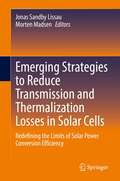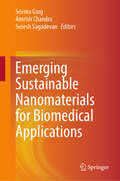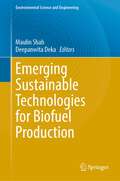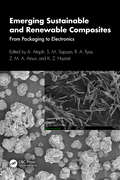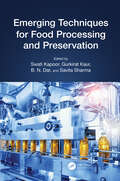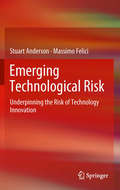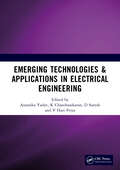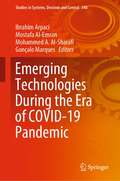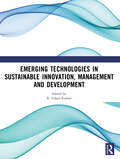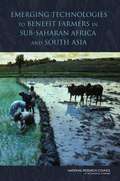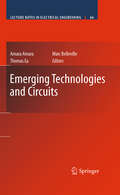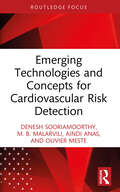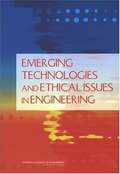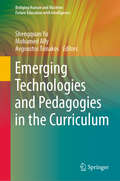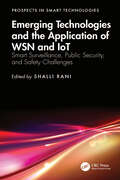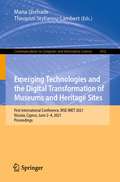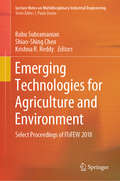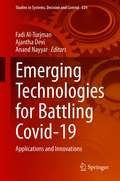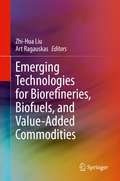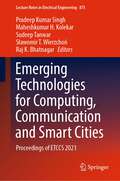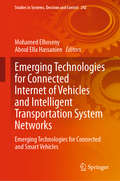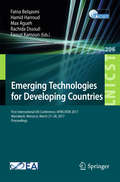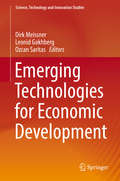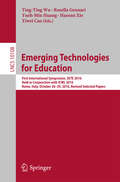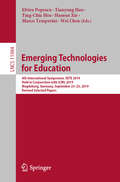- Table View
- List View
Emerging Strategies to Reduce Transmission and Thermalization Losses in Solar Cells: Redefining the Limits of Solar Power Conversion Efficiency
by Jonas Sandby Lissau Morten MadsenThe book describes emerging strategies to circumvent transmission and thermalization losses in solar cells, and thereby redefine the limits of solar power conversion efficiency. These strategies include the use of organic molecules and rare-earth metal materials. Approaches to augment the efficiency of these processes via near-field enhancement are described as well. This book includes a discussion of state-of-the-art implementations of these emerging strategies in solar cells, both internally, as in molecular intermediate band and charge carrier multiplication, and externally, such as photon up- and down-conversion. Tools for characterization are also provided. Written by leading researchers in the field, this book can be useful to both beginners and experienced researchers in solar energy.
Emerging Sustainable Nanomaterials for Biomedical Applications
by Seema Garg Amrish Chandra Suresh SagadevanThis book comprises a detailed overview of nanomaterials for biomedical applications and public health. Nanomaterials show various functions in medicine, sunscreens, electronic device, diagnostics, military applications, photovoltaic cells, paints, imaging, catalysts and drug delivery. In this book carbon Nanotubes/nanowires/nanofibers are explored for tissue engineering applications. Functionalized carbon nanotubes, silica Nanoparticle, silicon quantum dots, metal Decorated Nanomaterials, biogenic metal nanoparticles, magnetic functionalized nanomaterials and nanozymes have been covered for the treatment of bacterial Infections as carriers of gene delivery and for their biological applications. This book also explores nano-biotechnology and its approach for a sustainable future.
Emerging Sustainable Technologies for Biofuel Production (Environmental Science and Engineering)
by Maulin Shah Deepanwita DekaThis book is presented on biofuel production which includes different technologies developed and adopted to synthesize green renewable fuel alternatives for sustainable development. It also reflects different sources of biofuel, application of microbial community and microbial engineering to design fuel production and the biosynthetic pathways of biofuel production by microbes.Although the expenses for the physical and chemical technologies for energy production and fossil fuel utilization to protect our environment are very high, these technologies are not eco-friendly and safe. Hence, the need of certain modern eco-friendly and cost-effective techniques to protect our environment is deeply apprehended by different workers of this field. These techniques involve some feasible technologies utilizing different biological agents like microbes to produce renewable energy. This book provides an outline of the science behind the multidisciplinary aspects of biofuel production. It summarizes a solid foundation in the fundamentals and progresses to practical applications in this field. It structures stepwise route for a number of effective techniques to screen, select, identify and utilize microbes for biofuel production and utilization. It also focuses on the theoretical groundworks of biofuel production, recent technologies related to microbial engineering like myco-engineering technologies, microbial metabolism or modelling approaches to microbial physiology utilized for the same purpose. The techniques covered in this book ensure that scientists have the knowledge to practice effective biofuel production techniques themselves in a contaminated ecosystem in a sustainable way.Recent progress in the field of biofuels using microbial genetic engineering has larger perspectives in commercial-scale production. However, its large-scale production is still challenging; hence, to resolve this problem, it is essential to convert biomass into biofuels by developing novel technology to increase biofuel production to fulfil the current and future energy demand.
Emerging Sustainable and Renewable Composites: From Packaging to Electronics
by A. Atiqah, S. M. Sapuan, R. A. Ilyas, Z. M. A. Ainun, and K. Z. HazratiThis edited volume presents a comprehensive discussion of emerging sustainable and renewable composites from tropical fibres and provides an in-depth analysis of their prospective applications as replacements for conventional petroleum-based packaging and the challenges regarding this.Readers will gain a comprehensive understanding of the development and characterization of sustainable and renewable composites from fibres such as sugar palm, kenaf, sisal, curau, and coir. They will also learn about new potential materials from such fibres and their potential use in various nanoelectronics applications. Each chapter provides recent insight from some of the field’s most prominent industry and academic professionals. Chapter contributors present valuable case studies and describe related environmental issues, environmental advantages, and challenges. Topics include biodegradability, tensile and other physical properties, and applications. Consequently, readers can apply this knowledge to the further development of sustainable and renewable composites toward their global use in place of petroleum-based materials and in new electronics products.This book is an invaluable and accessible guide for researchers and postgraduate students of composites engineering and nanotechnology who wish to learn more about composites from tropical fibres and their applications. The practical information will benefit those who wish to advance research in this field and promote the adoption of these materials in areas including packaging and nanoelectronics.
Emerging Techniques for Food Processing and Preservation
by Savita Sharma B. N. Dar Swati Kapoor Gurkirat KaurThe demand for safe and healthy foods by consumers has increased the interest in developing new food processing techniques over the past decades. Emerging technologies and techniques are not just working to increase the shelf life of food but are also functioning to maintain the same quality of the food that makes it desirable in the first place. Emerging Techniques for Food Processing and Preservation is an essential guide for professionals and researchers in the food industry who seek to stay updated on the latest advancements in food processing and preservation techniques. This comprehensive book explores cutting-edge technologies that can enhance the quality and safety of food products while also improving their shelf life. With contributions from leading experts in the field, this book covers a wide range of topics, including Electrodialysis, Refractance Window Technology, Cold Plasma, Bio Speckle Laser Technique, Nanofluids, and many others. Each chapter includes detailed explanations of the principles behind these emerging techniques, as well as case studies that demonstrate their practical applications. In this book, readers will gain insights into the principles behind these emerging techniques, their advantages and limitations, and the practical applications in various food products. Whether you are a food scientist, engineer, or a food industry professional, this book will help you stay at the forefront of the rapidly evolving landscape of food processing and preservation.
Emerging Technological Risk
by Massimo Felici Stuart AndersonClasses of socio-technical hazards allow a characterization of the risk in technology innovation and clarify the mechanisms underpinning emergent technological risk. Emerging Technological Risk provides an interdisciplinary account of risk in socio-technical systems including hazards which highlight: · How technological risk crosses organizational boundaries, · How technological trajectories and evolution develop from resolving tensions emerging between social aspects of organisations and technologies and · How social behaviour shapes, and is shaped by, technology. Addressing an audience from a range of academic and professional backgrounds, Emerging Technological Risk is a key source for those who wish to benefit from a detail and methodical exposure to multiple perspectives on technological risk. By providing a synthesis of recent work on risk that captures the complex mechanisms that characterize the emergence of risk in technology innovation, Emerging Technological Risk bridges contributions from many disciplines in order to sustain a fruitful debate. Emerging Technological Risk is one of a series of books developed by the Dependability Interdisciplinary Research Collaboration funded by the UK Engineering and Physical Sciences Research Council.
Emerging Technologies & Applications in Electrical Engineering: Proceedings of the International Conference on Emerging Technologies & Applications in Electrical Engineering (ETAEE-2023), December 21-22, 2023, Raipur, India
by K. Chandrasekaran Anamika Yadav V. Hari Priya D. SureshThe First International Conference on Emerging Technologies and Applications in Electrical Engineering (ETAEE 2023) was hosted and organized by the Department of Electrical Engineering, National Institute of Technology, Raipur, held on 21st to 22nd December 2023, with CRC Press, Taylor and Francis as publication partner. ETAEE-2023 aims to emerge as a platform for in-depth discussions, knowledge sharing, and collaborative efforts. The main theme of the conference was “Sustainable Energy Future”. With professionals from academia, industry, and reputable research institutions coming together, the conference underlined the importance of staying at the forefront of technical breakthroughs to ensure a sustainable energy future. The presentations were delivered by participants on various topics such as Renewable Energy, Smart Grid, High Voltage Technologies, Power Electronics and Drives, Electric Transportation Systems, Instrumentation Control, and IoT Applications in Electrical Engineering. Esteemed academicians chaired these sessions, fostering in-depth discussions and knowledge exchange.
Emerging Technologies During the Era of COVID-19 Pandemic (Studies in Systems, Decision and Control #348)
by Mostafa Al-Emran Gonçalo Marques Ibrahim Arpaci Mohammed A. Al-SharafiThis book tackles the recent research directions in using the newly emerged technologies during the era of COVID-19 pandemic. It mainly focuses on using emerging technologies and their impact on health care, education, and society. It also provides insights into the current challenges and constraints in using technologies during the era of COVID-19 pandemic and exposes new opportunities for future research in the domain.
Emerging Technologies In Sustainable Innovation, Management and Development
by R. UdayakumarICETSIMD 2025 was conceived as a vital platform for academicians, researchers, and industry leaders. Its primary purpose was to explore the transformative potential of emerging technologies in driving sustainable development. To ensure the high quality, originality, and relevance of the contributions, all submissions to the ICETSIMD 2025 confer□ence underwent a rigorous double-blind peer review process.We received 300 manuscript submissions, from which 100 were selected for inclusion in the conference proceedings. Each manuscript was evaluated by at least two independent experts based on criteria including scientific rigor, methodological soundness, clarity, and contribution to the conference themes.
Emerging Technologies To Benefit Farmers In Sub-saharan Africa And South Asia
by National Research Council of the National AcademiesIncreased agricultural productivity is a major stepping stone on the path out of poverty in sub-Saharan Africa and South Asia, but farmers there face tremendous challenges improving production. Poor soil, inefficient water use, and a lack of access to plant breeding resources, nutritious animal feed, high quality seed, and fuel and electricity-combined with some of the most extreme environmental conditions on Earth-have made yields in crop and animal production far lower in these regions than world averages. Emerging Technologies to Benefit Farmers in Sub-Saharan Africa and South Asia identifies sixty emerging technologies with the potential to significantly improve agricultural productivity in sub-Saharan Africa and South Asia. Eighteen technologies are recommended for immediate development or further exploration. Scientists from all backgrounds have an opportunity to become involved in bringing these and other technologies to fruition. The opportunities suggested in this book offer new approaches that can synergize with each other and with many other activities to transform agriculture in sub-Saharan Africa and South Asia.
Emerging Technologies and Circuits
by Marc Belleville Amara Amara Thomas EaWith the semiconductor market growth, new Integrated Circuit designs are pushing the limit of the technology and in some cases, require specific fine-tuning of certain process modules in manufacturing. Thus the communities of design and technology are increasingly intertwined. The issues that require close interactions and collaboration for trade-off and optimization across the design/device/process fields are addressed in Emerging Technologies and Circuits. It contains a set of outstanding papers, keynote and tutorials presented during 3 days at the International Conference On Integrated Circuit Design and Technology (ICICDT) held in June 2008 in Minatec, Grenoble. The selected papers are spread over 5 chapters covering various aspects of emerging technologies and devices, advanced circuit design, reliability, variability issues and solutions, advanced memories and analog and mixed signals. All these papers are focusing on design and technology interactions and comply with the scope of the conference.
Emerging Technologies and Concepts for Cardiovascular Risk Detection
by Denesh Sooriamoorthy M. B. Malarvili Aindi Anas Olivier MesteThis accessible guide to advanced medical technologies and methodologies for monitoring, diagnosing, and predicting cardiovascular diseases addresses sensor technologies and non-invasive monitoring methods and looks at the growing integration of machine learning and AI.The authors guide readers from an introduction to the cardiovascular system and a review of traditional and modern diagnostic methods before explaining recent advances in medical technology, such as wearable smart devices and their sensor types (namely, pressure, photoelectric, and ultrasonic), and how these advances have been applied to cardiovascular disease diagnosis and detection. Key topics include pulse wave analysis, sensor technology for radial blood pressure monitoring, and the integration of artificial intelligence to enhance predictive accuracy. With a focus on continuous monitoring solutions, this book highlights groundbreaking research on non-invasive detection methods and the development of intelligent health systems for real-time patient evaluation. The authors also discuss how the widespread implementation of machine learning and deep learning techniques have influenced the field and propose new methods for enhancing continuous monitoring and risk prediction systems. The information within this book will help to bridge the gap between research and clinical practice.This short guide is a valuable resource primarily for academic readers in the fields of biomedical engineering, physics, computer science, and medical imaging. Clinicians will also benefit from the discussions of applications and future research and clinical trends.
Emerging Technologies and Ethical Issues in Engineering: Papers from a Workshop, October 14-15, 2003
by National Academy of Engineering StaffEngineers and ethicists participated in a workshop to discuss the responsible development of new technologies. Presenters examined four areas of engineering--sustainability, nanotechnology, neurotechnology, and energy--in terms of the ethical issues they present to engineers in particular and society as a whole. Approaches to ethical issues include: analyzing the factual, conceptual, application, and moral aspects of an issue; evaluating the risks and responsibilities of a particular course of action; and using theories of ethics or codes of ethics developed by engineering societies as a basis for decision making. Ethics can be built into the education of engineering students and professionals, either as an aspect of courses already being taught or as a component of engineering projects to be examined along with research findings. Engineering practice workshops can also be effective, particularly when they include discussions with experienced engineers. This volume includes papers on all of these topics by experts in many fields. The consensus among workshop participants is that material on ethics should be an ongoing part of engineering education and engineering practice.
Emerging Technologies and Pedagogies in the Curriculum (Bridging Human and Machine: Future Education with Intelligence)
by Mohamed Ally Shengquan Yu Avgoustos TsinakosThis book explores the technologies that can be used in curricula to make education “smarter” and more adaptive in order to better meet the needs of today’s learners. The main emphasis is based on the theory and best practices of incorporating emerging technologies into curricula so as to educate learners in the 21st century. The book provides valuable insights into the future of education and examines which pedagogies are most suitable for integrating emerging technologies. It will help educators and stakeholders design and implement curricula that effectively prepare learners for the challenges of tomorrow.
Emerging Technologies and the Application of WSN and IoT: Smart Surveillance, Public Security, and Safety Challenges (Prospects in Smart Technologies)
by Shalli RaniThe Internet of Things (IoT) has numerous applications, including smart cities, industries, cloud-based apps, smart homes, and surveillance.The Internet of Things (IoT) enables smarter living by connecting devices, people, and objects. As networking became a crucial aspect of the Internet, rigorous design analysis led to the development of new research areas.The Internet of Things has revolutionized daily living in countless ways. It enables communication between buildings, people, portable gadgets, and vehicles, facilitating mobility. Smart cities and cloud-based data have transformed corporate practices. With billions of connected gadgets, everything will soon be able to communicate remotely. IoT networks, whether public or private, rely significantly on machine learning and software-defined networking. Indian and other governments have approved various research projects on IoT-based networking technologies. This field of study will significantly impact society in the future.Researchers are concerned about the many application areas and driving forces behind smart cities. The authors aim to provide insights into software-defined networking, artificial intelligence, and machine learning technologies used in IoT and networking. The framework focuses on practical applications and infrastructures. The book includes practical challenges, case studies, innovative concepts, and other factors that impact the development of realistic scenarios for smart surveillance. It also highlights innovative technology, designs, and algorithms that can accelerate the creation of smart city concepts.This resource includes real-world applications and case studies for smart city technology, enormous data management, and machine learning prediction, all with confidentiality and safety problems.
Emerging Technologies and the Digital Transformation of Museums and Heritage Sites: First International Conference, RISE IMET 2021, Nicosia, Cyprus, June 2–4, 2021, Proceedings (Communications in Computer and Information Science #1432)
by Theopisti Stylianou-Lambert Maria ShehadeThis book constitutes the post-conference proceedings of the First International Conference on Emerging Technologies and the Digital Transformation of Museums and Heritage Sites, RISE IMET 2020, held in Nicosia, Cyprus, in June 2021*.The 23 revised full papers were carefully reviewed and selected from 38 submissions. The papers are organized in the following topical sections: digital curation and visitor engagement in museums and heritage sites; VR, AR, MR, mobile applications and gamification in museums and heritage sites; digital storytelling and embodied characters for the interpretation of cultural heritage; emerging technologies, difficult heritage and affective practices; participatory approaches, crowdsourcing and new technologies; digitization, documentation and digital representation of cultural heritage.* The conference was held virtually due to the COVID-19 pandemic.
Emerging Technologies for Agriculture and Environment: Select Proceedings of ITsFEW 2018 (Lecture Notes on Multidisciplinary Industrial Engineering)
by Krishna R. Reddy Babu Subramanian Shiao-Shing ChenThis book comprises select proceedings of the International Conference on Emerging Technologies for Farming – Energy & Environment – Water (ITsFEW 2018). The contents are divided into three parts viz., (i) Developments in Farming, (ii) Energy and Environment, and (iii) Water Conservation and Management. The book aims to provide timely solutions, using innovative and emerging technologies, to the global challenges in agriculture, energy, environment, and water management. Some of the topics covered in this book include remote sensing for smart farming, GIS, irrigation engineering, soil science and agronomy, smart grids, renewable energy, energy management systems, energy storage technologies, biological water treatment, industrial waste water treatment, watershed management and sustainability. Given the wide range of topics discussed, the book will be very useful for students, researchers and practitioners interested in agricultural and environmental engineering.
Emerging Technologies for Battling Covid-19: Applications and Innovations (Studies in Systems, Decision and Control #324)
by Fadi Al-Turjman Anand Nayyar Ajantha DeviThe book presents recent trends and solutions to help healthcare sectors and medical staff protect themselves and others and limit the spread of the COVID-19. The book also presents the problems and challenges researchers and academics face in tackling this monumental task. Topics include: Unmanned Aerial Vehicle (UAV) or drones that can be used to detect infected people in different areas; robots used in fighting the COVID-19 by protecting workers and staff dealing with infected people; blockchain technology that secures sensitive transactions in strict confidentiality. With contributions from experts from around the world, this book aims to help those creating and honing technology to help with this global threat.
Emerging Technologies for Biorefineries, Biofuels, and Value-Added Commodities
by Zhi-Hua Liu Art RagauskasThis book provides in-depth coverage on the latest concepts, systems, and technologies that are being utilized in biorefineries for the production of biofuels and value-added commodities. Written by internationally recognized experts, the book provides a comprehensive overview of pretreatment technology for biorefineries and biofuels, enzymatic hydrolysis and fermentation technology for biofuel production, and lignin valorization for developing new products from waste lignin. The book will be a valuable resource for researchers and professionals working in process engineering, product engineering, material science, and systems and synthetic biology in the fields of biorefining, biofuel, biomaterials, environmental waste utilization, and biotechnology.
Emerging Technologies for Computing, Communication and Smart Cities: Proceedings of ETCCS 2021 (Lecture Notes in Electrical Engineering #875)
by Pradeep Kumar Singh Maheshkumar H. Kolekar Sudeep Tanwar Raj K. Bhatnagar Sławomir T. WierzchońThis book presents best selected papers presented at the Second International Conference on Emerging Technologies for Computing, Communication and Smart Cities (ETCCS 2021) held on 21-22 August 2021 at BFCET, Punjab, India. IEI India members supported externally. It is co-organized by Southern Federal University, Russia; University of Jan Wyżykowski (UJW), Polkowice, Poland, SD College of Engineering & Technology, Muzaffarnagar Nagar, India as an academic partner and CSI, India for technical support. The book includes current research works in the areas of network and computing technologies, wireless networks and Internet of things (IoT), futuristic computing technologies, communication technologies, security and privacy.
Emerging Technologies for Connected Internet of Vehicles and Intelligent Transportation System Networks: Emerging Technologies for Connected and Smart Vehicles (Studies in Systems, Decision and Control #242)
by Aboul Ella Hassanien Mohamed ElhosenyThis book discusses vehicular communication systems, IoT, intelligent transportation systems and the Internet of Vehicles, and also introduces destination marketing in a structured manner. It is primarily intended for research students interested in emerging technologies for connected Internet of Vehicles and intelligent transportation system networks; academics in higher education institutions, including universities and vocational colleges; IT professionals; policy makers; and legislators. The book can also be used as a reference resource for both undergraduate and graduate studies. Written in plain and simple language, it describes new concepts so that they are accessible to readers without prior knowledge of the field.
Emerging Technologies for Developing Countries
by Fatna Belqasmi Max Agueh Hamid Harroud Rachida Dssouli Faouzi KamounProceedings USB Flash Drive distributed free of charge to participants in the AFRICATEK 2017 conference.
Emerging Technologies for Economic Development (Science, Technology and Innovation Studies)
by Leonid Gokhberg Dirk Meissner Ozcan SaritasThis book provides an impressive overview of emerging technologies, especially nanotechnologies and biotechnologies, and their prospective applications. It identifies and describes existing and potential markets for emerging technology-based applications, and projects scenarios for macroeconomic development based on these technologies. Integrated roadmaps for the development of a nano- and bioindustry are shown and policy measures and corporate strategies developed to advance these technologies. These measures are illustrated using roadmaps and policy case studies.The book combines a practical, comprehensive overview of the technical side of emerging technologies and their applications in various fields with an analysis of market developments and characteristics.
Emerging Technologies for Education
by Yiwei Cao Yueh-Min Huang Ting-Ting Wu Rosella Gennari Haoran XieThis book constitutes the thoroughly refereed post-workshop proceedings of the First International Symposium, SETE 2016, held in conjunction with ICWL 2016, Rome, Italy, in October 2016. The 81 revised papers, 59 full and 22 short ones, were carefully reviewed and selected from 139 submission. They cover latest findings in various areas, such as emerging technologies for open access to education and learning; emerging technologies supported personalized and adaptive learning; emerging technologies support for intelligent tutoring; emerging technologies support for game-based and joyful learning; emerging technologies of pedagogical issues; emerging technologies for affective learning and emerging technologies for tangible learning.
Emerging Technologies for Education: 4th International Symposium, SETE 2019, Held in Conjunction with ICWL 2019, Magdeburg, Germany, September 23–25, 2019, Revised Selected Papers (Lecture Notes in Computer Science #11984)
by Wei Chen Elvira Popescu Marco Temperini Haoran Xie Tianyong Hao Ting-Chia HsuThis book constitutes the thoroughly refereed post-workshop proceedings of the 4th International Symposium, SETE 2019, held in conjunction with ICWL 2019, in Magdeburg, Germany, in September 2019. The 10 full and 6 short papers presented together with 24 papers from 5 workshops were carefully reviewed and selected from 34 submissions. The papers cover the latest findings in various areas, such as: virtual reality and game-based learning; learning analytics; K-12 education; language learning; design, model and implementation of e-learning platforms and tools; digitalization and industry 4.0; pedagogical issues, practice and experience sharing.
